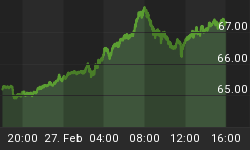A morbidly obese gentleman labored into Dr. Hayek's office suffering from severe chest pain. The patient also complained that he was unable to consume his usual 10,000 calorie-per-day diet; in fact, he was feeling so sick that he could barely scarf down 9,000 calories. He plead that his love for food remained as strong as ever, but his body just wasn't keeping up with his demands.
After having a thorough look at the patient, the good doctor could not find anything wrong outside of the patient's extreme portliness. After a moment of reflection, he delivered to his patient a troubling diagnosis. He explained that the chest pain stemmed from the strain the patient's 500lb body was putting on his heart, and that the lack of appetite was his body's attempt to protect itself from this imbalance. Dr. Hayek's prescription was simple: the patient had to dramatically reduce his consumption while undertaking a moderate exercise program, with the goal of losing 250lbs as quickly and safely as possible. Dr. Hayek was aware that it would be a physically painful and emotionally difficult process for the man, but it was the only way to avert a life of suffering - or even a heart attack.
Unfortunately, our patient rebelled against such an austere program. He had grown very fond of his high-calorie and high-fat diet and didn't think that now, when he was already depressed from dealing with all these ailments, was a good time to deny himself the few pleasures he had left. In his opinion, the doc's prescription was just too simplistic. He thought there just had to be a way to have his cake and eat it - frequently. So, he waddled out of Dr. Hayek's office as fast as he could, shouting over his shoulder: "I'm getting a second opinion!"
The overweight gentleman sauntered across the street, where he found the office of Dr. Keynes. He told the new doctor about his acute chest pain and lack of appetite, and complained about the previous doctor's "heartless" prescription. After a cursory examination, Dr. Keynes rendered his diagnosis: the patient's condition did not stem from the fact that his gigantic frame was causing undo strain on his heart; instead, the doctor concluded, the patient's chest pain was merely causing a temporary lack of hunger. Furthermore, Dr. Keynes argued, the stress of cutting weight at the present time would certainly prove detrimental to the man's already weak heart. Therefore, his prescription was for the 500lb man to each as much as possible, as quickly as possible. Anything less might cause the man to suffer a heart attack, he noted. Now the doctor did concede that, at some point in the distant future, it might be a good idea for the man to shed a few pounds. But for the present, the most import thing to do would be to consume as much as he could stomach.
The patient left Dr. Keynes' office with a broad smile. After gorging at an all-you-can-eat buffet, he momentarily forgot about his chest pain. It looked like he had found his solution; except, a week later, he died.
The Hubris of Government
The allegory above discusses the dangers of quackery, whether medical or economic. Right now, economic quackery - in the form of Keynesianism - has overtaken Washington. American consumers are trying their best to deleverage. In terms of the story, the patient is actually trying to lose weight. But the government is blocking deleveraging and trying to boost consumption. They are forcing food down the patient's throat. According to the Flow of Funds Report, households reduced debt at a 2.4% annualized rate ($330 billion) during Q1 of 2010. Meanwhile, the federal government was piling on debt at an 18.5% annual rate ($1.44 trillion). Since every dollar of government debt is a promise to tax the private sector in the future with interest, this public spending spree effectively negated the Herculean efforts of the private sector to return to a sustainable path.
That's where the arrogance of Washington is really apparent. Scores of millions of American consumers have made the decision that reducing their debt burden is in their best interests right now. But a few hundred individuals in government believe they know better than the collective wisdom of the entire free market. By leveraging up the public sector, they have used their power to confiscate our savings. In short, they are forbidding us from following the common sense path to fiscal health.
Unlike their forbears, modern-day Keynesians do not argue just for mollification in the rate of deleveraging. They seek to significantly increase debt levels in an effort to boost the aggregate demand in the economy. Apparently, only once the mythical recovery takes hold due to government spending, printing, and borrowing does a discussion of deficits become appropriate.
The US has persisted under this theory for close to a century, though with a declining quality of life. Unfortunately, the patient has now gone critical. Curiously, the world has yet to fully recognize our precarious condition, even as they provide us with life support. Washington is now entirely dependent on the reserve currency status of the dollar and the continued hibernation of bond vigilantes. Without these supports, the United States would face complete economic arrest. Rather than allowing the American people to get back on our feet, Washington is stuffing us with even more debt. It's almost as if the feds are daring our foreign creditors to pull the plug. As a consequence, I predict that just as Dr. Keynes killed his patient, Keynesian economics will kill our economy.
For in-depth analysis of this and other investment topics, subscribe to Peter Schiff's Global Investor Newsletter. Click here for your free subscription.
Click here to download Peter's latest Special Report: My Five Favorite Gold & Silver Mining Stocks.
Be sure to pick up a copy of Peter Schiff's just-released economic fable, How an Economy Grows and Why It Crashes. Click here to learn more and order.















